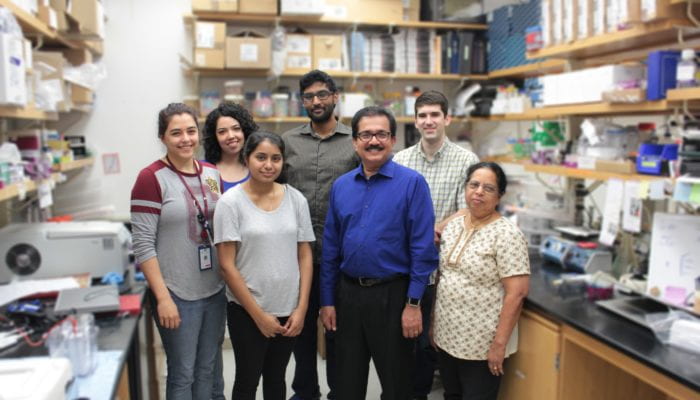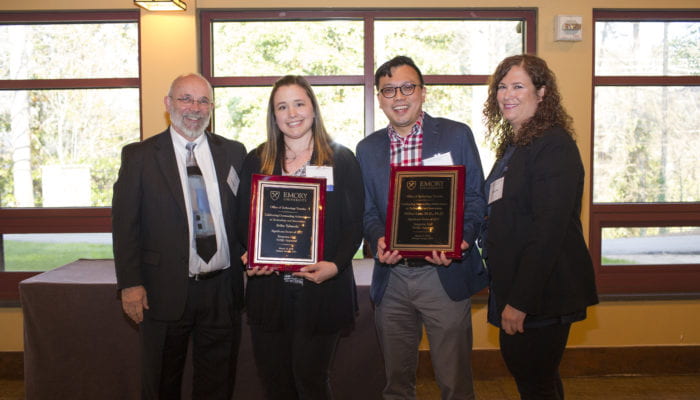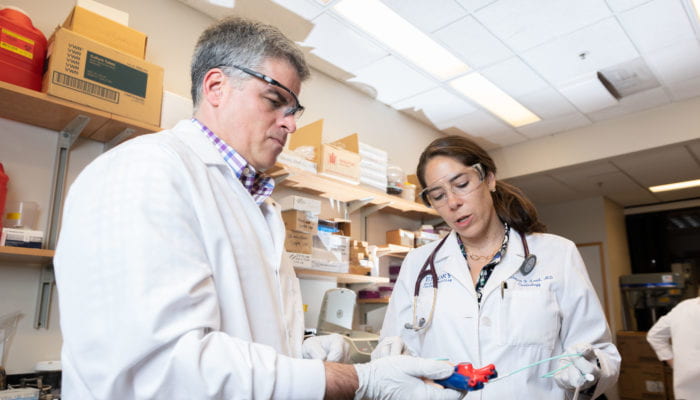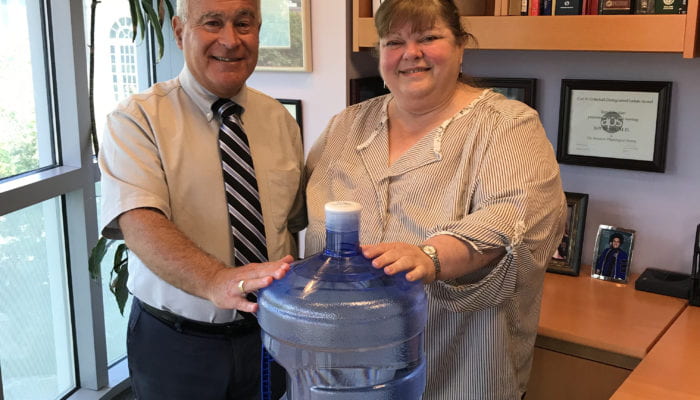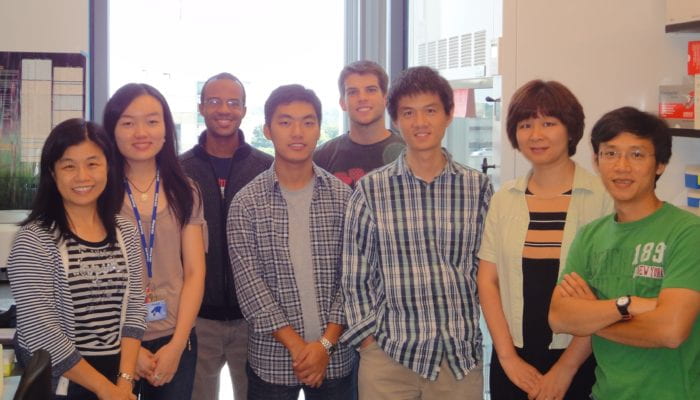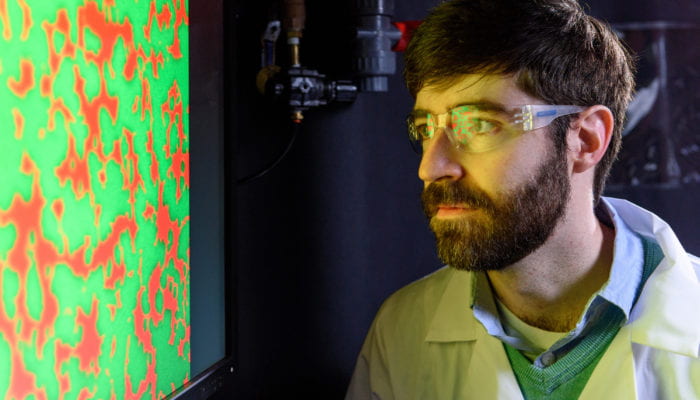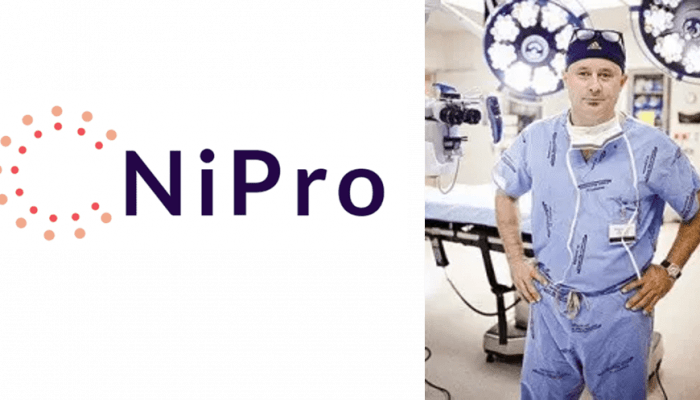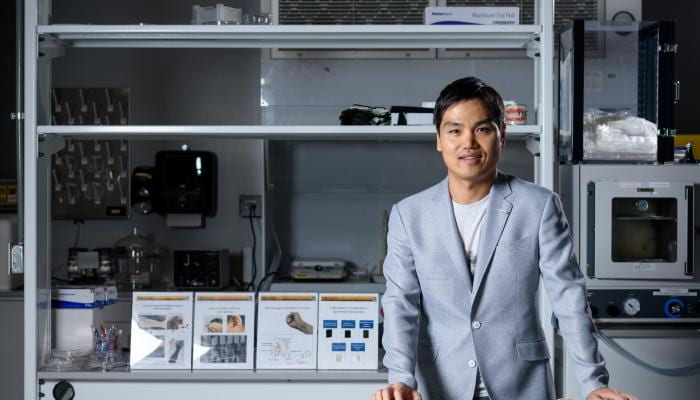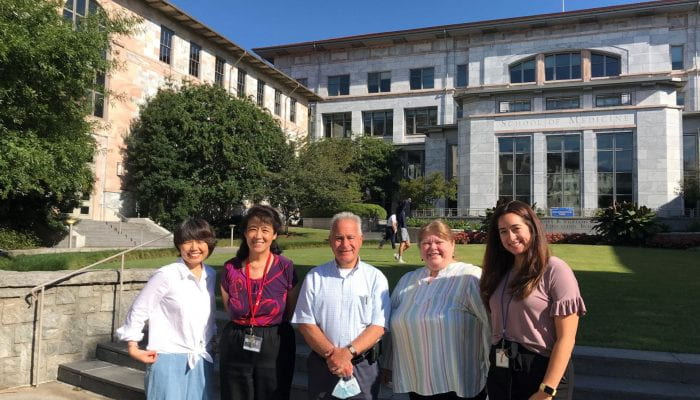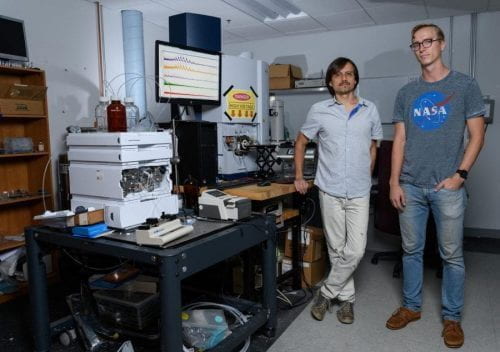Our full portfolio is available here: Biolocity Portfolio.
Funding Year 2023-2024
- Cellcue Bio: A 3D microfluidic platform with improved prediction of clinical outcomes for cell therapies leveraging the power of advanced microfluidic technology. This innovation could enhance the efficacy and safety of cell-based treatments, opening new avenues for personalized medicine and regenerative therapies. Project Leads: Andrés Garcia, Ph.D. (Georgia Tech) and Wilbur Lam (Emory University)
- Mageia Therapies: A therapeutic enzyme to reverse immunosuppression in solid tumors. By leveraging their expertise in immunology and oncology, Mageia Therapies seeks to unlock the full potential of the immune system in combating cancer. Their breakthrough approach directly targets a key signaling pathway in cancer immunosuppression, enabling immunotherapy for a variety of solid tumor types. Project Lead: John Blazeck, Ph.D. (Georgia Tech)
- Next-Gen 5-FU: Safer and more effective next-generation 5-fluorouracil (5-FU) based therapeutics. By leveraging novel prodrug strategies and innovative formulations, they seek to enhance the therapeutic efficacy of 5-FU-based compounds while minimizing adverse side effects. Project Leads: Dennis Liotta, Ph.D., Eric Miller, Ph.D., Nicole Pribut, Ph.D., and John Petros, MD (Emory University)
- OZ-Link: A generalizable delivery platform that enables extended and precise drug delivery. By utilizing cutting-edge technologies and advanced formulation strategies, OZ-Link seeks to overcome the challenges associated with targeted drug delivery. Their groundbreaking platform has the potential to revolutionize various therapeutic areas. Project Leads: M.G. Finn, Ph.D. and Kasie Collins, Ph.D. (Georgia Tech)
Funding Year 2022-2023
- Athena: An early-stage cell therapy company developing a mesothelin-specific chimeric antigen receptor (CAR) T cell product, for the treatment of mesothelioma and other mesothelin expressing solid tumors. Principal Investigator: Crystal Paulos, Ph.D. (Emory University).
- Bystro by revXon: A search engine for your life-sciences data. Principal Investigator: Thomas Wingo, MD (Emory University).
- DexaPatch: Low-swelling, steroid-releasing, implantable hydrogel platform to reduce post-operative inflammation in tight surgical spaces. Principal Investigators: Andrés Garcia, Ph.D. (Georgia Tech), Adam Klein, M.D., Daniel Refai, M.D., Stephen Linderman, M.D., Ph.D. (Emory).
- MagTrack: MagTrack is a wearable alternative controller that simplifies power wheelchair driving and the control of digital devices for people living with tetraplegia. Principal Investigators: Nordine Sebhki, Ph.D., and. Omer Inan, Ph.D. (Georgia Tech).
- Orally Bioavailable CXCR4 Antagonists for the Treatment of Cancer: Best-In-Class Orally Bioavailable CXCR4 Antagonists Heat Up Solid Tumors. Principal Investigators: Dennis Liotta, Ph.D., Eric Miller, Ph.D., Haydn Kissick, Ph.D., and John Petros, M.D. (Emory University).
- ProLymph Nano: Drug delivery technology unlocks new market opportunities by targeting the lymphatic system. Principal Investigator: Susan Thomas, Ph.D. (Georgia Tech).
Funding Year 2021-2022
- Agrithera: A therapeutic strategy to overcome the pharmacological drawbacks of cannabidiol (CBD) for epilepsy treatment by creating precursor molecules that metabolize to CBD in the body. Principal Investigators: Dennis Liotta, Ph.D., and Stephen Traynelis, Ph.D., Emory University.
- NiPro: A customized nipple prosthesis with a subcutaneous anchoring system to help patients with body image issues after breast reconstruction. Principal Investigator: Nick Boulis, M.D., Emory University.
- Sanicka: A clinical decision support tool to aid treatment selection and optimization for leukemia patients. Principal Investigators: Ana Quiroga, Ph.D., and Sakis Mantalaris, Ph.D., Georgia Tech; and Nicki Panoskaltsis, M.D., Ph.D., Emory University.
- Sleep Monitoring Biopatch: A soft, wearable biosensor patch and accompanying software to enable at-home sleep testing. Principal Investigators: Hong Yeo, Ph.D., Georgia Tech and Paul Zolty, M.D., Piedmont Hospital.
- Urearetics: A novel mechanism to treat uremic pericarditis and pericardial effusions in chronic kidney disease patients by inhibiting urea transport. Principal Investigators: Jeff Sands, M.D.; Janet Klein, Ph.D.; and Xiaonan Wang, M.D., Emory University.
Funding Year 2020-2021
- Dynamic Sampling Platform (now incorporated as Andson Biotech): This platform technology aims to provide simple, accurate, and low-cost quality monitoring for cell therapy bioreactors. Principal Investigators: Andrei Fedorov, PhD, Georgia Tech, Edwin Horwitz, MD, Emory University, and Mason Chilmonczyk, PhD, Georgia Tech.
- Focused Cryo: A cryoablation system designed to aid in targeting peripheral nerves in a highly precise manner. The platform has applications in metabolic syndromes, obesity, hypertension, diabetes, and chronic pain. Principal Investigators: David Prologo, MD, FSIR, Emory University.
- NanoCliq: A vaccine technology that leverages protein nanoparticle platform to prevent the onset of Leishmaniasis, a fatal disease that currently has no vaccine available. Principal Investigator: M.G. Finn, PhD, Georgia Tech.
- New Therapeutic for Inflammatory Bowel Disease (IBD): The development of an LRH-1 agonist drug which increases innate steroid production specifically at the site of inflammation in the gut. Principal Investigators: Nathan Jui, PhD, Emory University, Eric Ortlund, PhD, Emory University, and John Calvert, PhD, Emory University.
- Twice Therapeutics: A two-step method that can deliver long-lasting gene therapies to diseased tissues without re-engineering viruses. Principal Investigators: James Dahlman, PhD, Georgia Tech and Eric Sorscher, MD, Emory University
- Tricuspid Leaflet Enhancer (TriLEN): A modified leaflet implant that can be sized for pediatric patients to repair tricuspid or atrioventricular valve regurgitation. Principal Investigator: Muralidhar Padala, PhD, Emory University. Support for this project is in partnership with Additional Ventures.
- Piggy-Back Heart: A self-powered heart pump that harvests native motion of the right ventricle to enhance blood flow in Fontan circulation for patients with hypoplastic left or right heart syndrome. Principal Investigator: Muralidhar Padala, PhD, Emory University. Support for this project is in partnership with Additional Ventures.
Funding Year 2019-2020
- 12X Bone Regeneration for Spinal Fusion: a re-purposed, generic small molecule that induces bone formation to improve spinal fusion and prevent non-union. Principal Investigators: Nick Willett, PhD, Emory University, Scott Boden, MD, Emory University, Sreedhara Sangadala, PhD, Emory University.
- Heteroresistance AST: an approach to determine antibiotic susceptibility, resistance, and hetero resistance within two hours of blood culture. Principal Investigators: David Weiss, PhD, Emory University and Peter Yunker, PhD Georgia Tech.
- SaGA for Cancer Drug Discovery: a proprietary platform technology utilizing a novel isolation assay for metastatic “leader” cells in solid tumors to develop novel cancer therapeutics. Principal Investigator: Adam Marcus, PhD, Emory University.
- SIRPant Immunotherapeutics: SIRPαlow engineered macrophages immunotherapy for treatment of solid tumors. Principal Investigators: Yuan Li, PhD, Georgia State University and Ned Waller, MD, PhD, FACP, Emory University.
- Verso Transcaval Docking Station: a device that allows clinicians to precisely deliver and position existing transcatheter aortic or mitral valves in the IVC for treatment of Tricuspid Regurgitation. Principal Investigator: Jorge Jimenez, PhD, Georgia Tech.
Funding Year 2018-2019
- Marpe Therapeutics: (formerly Antiviral Peptide): a broad-spectrum antiviral drug used for the treatment of 3 pandemic viruses: Influenza, Zika, and Dengue. This is the second year of funding for the Antiviral project. Principal Investigator: Joshy Jacobs (Emory).
- AD Diagnostic: a mass spectrometry-based immunoassay that can detect and track biomarkers to determine progression of neurodegenerative disease earlier and more reliably than clinical manifestation of symptoms. Principal Investigators: Allan Levey, MD, PhD (Emory), Duc Duong (Emory), Nick Seyfried, PhD (Emory).
- Guide Therapeutics: (formerly Nanoparticles/RNA Barcodes): a high throughput DNA barcoding platform that identifies lipid nanoparticles that can deliver gene therapies to targeted tissues and organs with high specificity. Principal Investigator: James Dahlman, PhD (Georgia Tech).
- Steerable Guidewire: a robotically steerable guidewire tip to enable greater maneuverability and navigation in peripheral vascular spaces. Principal Investigators: Jaydev Desai, PhD (Georgia Tech), Zach Bercu, MD, RPVI (Emory).
- Lybbie: (formerly TUMAAS Breast Pump): a wearable, portable breast pump that can draw milk with minimal noise. Principal Investigator: Andrea Joyner, MD, FACOG, IBCLC (Emory).
- Wheelchair In-seat Activity Tracker (WiSAT): an in-seat activity tracker for those with spinal cord injury to encourage weight shifts and reduce pressure ulcer formation. Principal Investigators: Sharon Sonenblum, PhD (Georgia Tech) and Stephen Sprigle, PhD (Georgia Tech). Support for this project is in partnership with the Praxis Spinal Cord Institute.
Funding Year 2017-2018
- Marpe Therapeutics: (formerly Antiviral Peptide) a broad-spectrum antiviral drug used for the treatment of 3 pandemic viruses: Influenza, Zika, and Dengue. Principal Investigator: Joshy Jacobs (Emory).
- Biological Pacemaker: a heart pacing treatment for pediatric patients; this RNA and small molecule combination therapy converts cardiomyocytes into pacemaking cells, eliminating the need for an implantable heart-pacing device. Principal investigators: Hee Cheol Cho (Emory), Jonathan Langberg (Emory), Phil Santangelo (Georgia Tech).
- Centizyme: (formerly Inhaled GeneRges)an antisense technology consisting of a topical gold nanoparticle coated with specific deoxyribozymes (DNAzymes), which regulate and silence pro-inflammatory cytokines that cause severe asthma exacerbations. Principal investigators: Cherry Wongtrakool (Emory) and Khalid Salaita (Emory).
- NephroDI Therapeutics: a new therapeutic that restores water balance in pediatric patients with nephrogenic diabetes insipidus (NDI), an x-linked genetic disorder that can lead to mental retardation as a result of dehydration. Principal investigators: Janet Klein (Emory) and Jeff Sands (Emory).
- Periurethral Targeting Device: a device that will allow direct, controlled placement of bulking agents into the female urethra thereby increasing the efficacy of stress urinary incontinence treatment. Principal Investigator: Niall Galloway (Emory).
Funding Year 2016-2017
- CorAmi: A drug delivery platform for localized delivery of therapeutic-seeded hydrogels to the pericardial space. This is the second year of funding for Ad Cor (known last year as Levit Catheter). Principal investigators: Andrés García (Georgia Tech/Petit Institute researcher), Rebecca Levitt (Emory).
- CAR T Cell Manufacturing: Cell processing and treatment technologies that will enable better manufacturing and functionalization of therapeutic T-Cells for patients with Diffuse B Cell Leukemia. Principal investigators: Todd Sulchek (Georgia Tech/Petit Institute researcher), Edmund Waller (Emory/Petit Institute researcher).
- CODOXO (formerly FraudScope): Provides intelligent claims analysis to help identify, address, and mitigate payment of fraudulent healthcare billing. Principal investigators: Musheer Ahmed (Georgia Tech), Mustaque Ahamad (Georgia Tech), Richard Duszak (Emory).
- MitraPlug: A transcatheter implant that seeks to “plug” the fluid path, which is seen in patients with mitral regurgitation. Principal investigators: Murali Padala (Emory/Petit Institute researcher), Eric Sarin (Emory).
- Subconjunctival Injector: A device which allows for safe, efficient, and controlled delivery of ophthalmic therapeutics to the subconjunctival space of the eye. Principal investigators: Ross Ethier (Georgia Tech/Petit Institute researcher), Rand Allingham (Duke University).
Funding Year 2015-2016
- Sanguina (formerly AnemoCheck): a simple, disposable, handheld biochemical device that is inexpensive, accurate and provides a quantitative evaluation of anemia in less than two minutes (principal investigators: Wilbur Lam and Erika Tyburski).
- AngioCloud: cloud-based software that assists interventional neurologists with the selection and deployment of flow diverters for the treatment of unruptured brain aneurysms (principal investigators: Frank Tong and Alessandro Veneziani).
- Cardiovascular MR Imaging: method of uploading, displaying, and automatically analyzing cardiovascular magnetic resonance function, viability and perfusion studies (principal investigators: Ernest Garcia, John Oshinski, Gerald Pohost and Anthony Yezzi).
- InvisiCool: gel to alleviate heat-related pain while not otherwise affecting the effectiveness of laser treatments (principal investigators: Jeff Dover, Andrei Fedorov and Craig Green).
- New CRRT K: a low-volume, low-error continuous renal replacement therapy (CRRT) device for pediatric patients. There are currently no FDA-approved CRRT devices for patients who weigh less than 20 kilograms, and the KIDS technology is being developed to meet this unmet need (principal investigators: Shiva Arjunon and Matt Paden).
- CorAmi: (formerly Levit Catheter) a drug delivery catheter for localized delivery of therapeutic-seeded hydrogels to the pericardial space (principal investigators: Andres Garcia and Rebecca Levit).
- Nanocomposite Scintillators: an imaging replacement for current, expensive crystals (principal investigators: Brooke Beckert, Eric Elder and Jason Nadler).
- IC3D: an imaging silicon chip for Chronic Total Occlusion (CTO) procedures with improved visualization for physicians (principal investigators: Levent Degertekin and Habib Samady).


